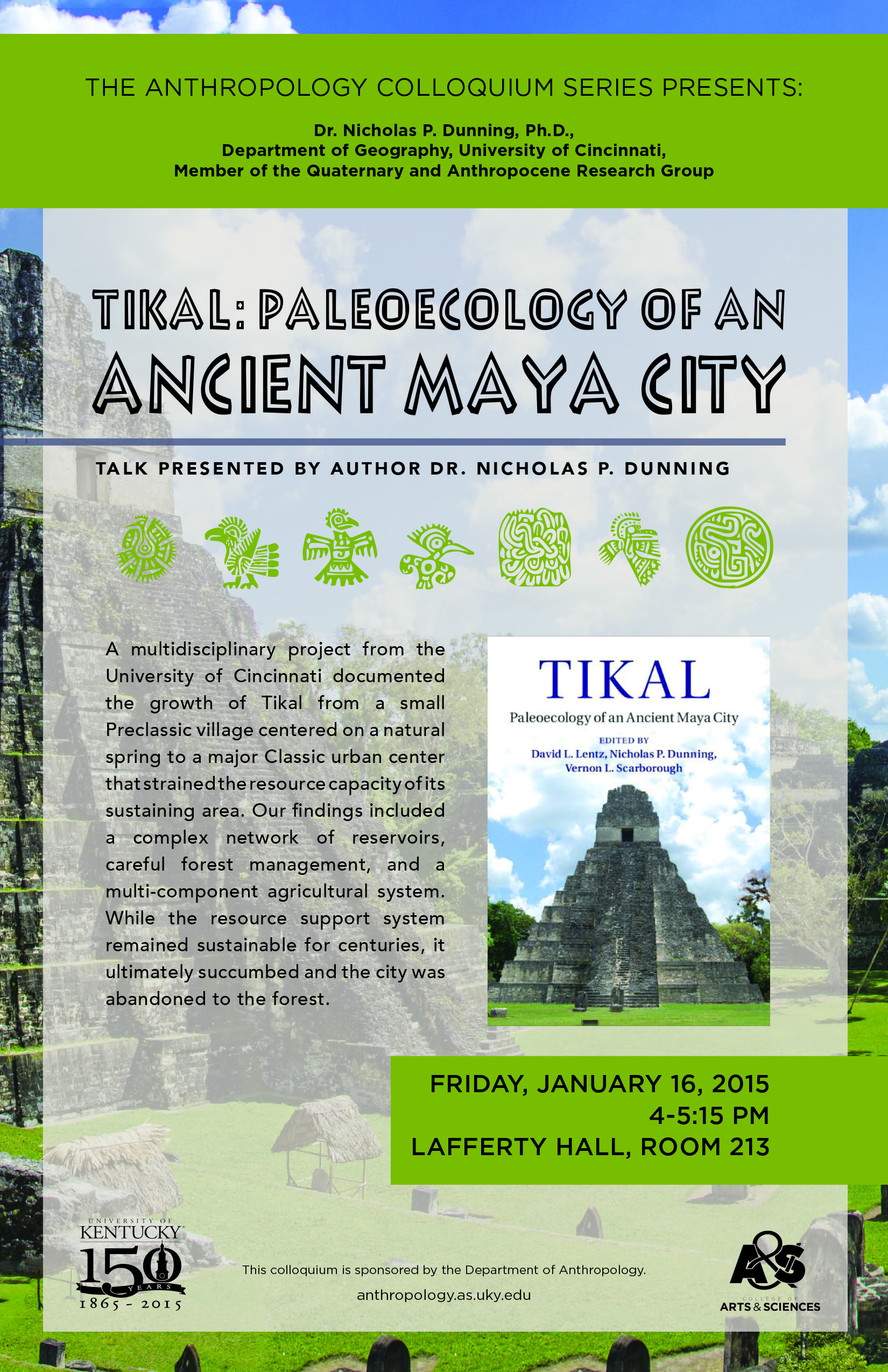Rast-Holbrook Seminar
4:00-4:25 Dr. Adam Milewski, Assistant Professor of Geology, University of Georgia, "The Past, Present, and Future of Water Resources in the Middle East and North Africa Region"
4:30-4:55 Dr. Neda Zawahri, Associate Professor of Political Science, Cleveland State University, "Management of Transboundary Rivers in the Middle East"
5:00-5:25 Discussion moderated by Dr. Alan Fryar
Lexington Old-Time Music Gathering
Please, join in the fun at the Lexington Old-Time Music Gathering in Lexington, KY! This event spans February 12, 2015 through February 15, 2015 and has something for everyone. This is an opportunity for community engagement, learning about traditional mountain music, and hearing artists perform. During the Saturday, 2/14/15 event, there will be fun for all ages at the Appalachian Youth Day portion of the event from 12 p.m. to 5 p.m. Admission for the Youth Day is free, and there will be workshops, open mic, jam sessions, singing, and dances! (Please note that a parent must accompany children at all times.) Please, see the Lexington Old-Time Music Gathering website for detailed information, including a full schedule of performers and events: http://lexoldtime.com/.

Tikal: Paleoecology of an Ancient Maya City

Clive Barnett (University of Exeter)
Helen Lawton-Smith (University of Arizona)
Helen Lawton Smith
Helen Lawton Smith is Professor of Entrepreneurship, Department of Management, Birkbeck, University of London. Her research career has focused on the links between entrepreneurship, innovation, public policy and regional development in national and international contexts. She is the Founder and Research Director of the Oxfordshire Economic Observatory, School of Geography and the Environment, Oxford University (http://oeo.geog.ox.ac.uk) and is Director of the Birkbeck Centre for Innovation Management Research (http://bbk.ac.uk/innovation). She is the author of nine books and of over ninety journal articles and book chapters and is Associate Editor, Strategic Change:Briefings in Entrepreneurial Finance. She is the UK principal investigator of a European Union project Transforming Institutions by Gendering Contents and Gaining Equality in Research (TRIGGER) (2013-2017).
Health Justice and Ending the War at Home
Health Justice and Ending the War at Home
Jenna M. Loyd
One of the forgotten gains of the social movements of the 1960s and 1970s is in making a place for health as a right and means of politics. Health Rights Are Civil Rights: Peace and Justice Activism in Los Angeles, 1963–1978 situates the struggle over health in Los Angeles within the context of both the Vietnam War and domestic conflicts over the racial economy and social welfare. The book describes how Black freedom, antiwar, welfare rights, and women’s movement activists formed alliances to battle oppressive health systems and structural violence, working to define health as a matter of individual and collective self-determination. This talk reflects on the legacy of these movements for the contemporary moment of Black Lives Matter.
Jenna M. Loyd received her PhD in geography from the University of California, Berkeley, and is assistant professor of public health policy and administration at the Joseph J. Zilber School of Public Health at University of Wisconsin-Milwaukee. She is a coeditor of Beyond Walls and Cages: Prisons, Borders, and Global Crisis.

Practical Panarchy; Assessing Adaptive Capacity of Regional Water Systems in the United States to Changing Climate
Practical Panarchy; Assessing Adaptive Capacity of Regional Water Systems in the United States to Changing Climate
During the 20th century, large public investments led to the development of complex regional scale water management systems across the United States. Currently, these social-ecological systems are characterized by legal conflict, social gridlock and continued erosion of many ecosystem services. Changing climate may continue this trajectory, but it may also provide a catalyst for renewal of ecosystems and a window of opportunity for institutional change. This presentation will review preliminary results and synthesis from an interdisciplinary team of legal scholars, geographers and ecologists who assessed the resilience of six regional water systems; the Columbia, Klamath, Rio Grande, Platte and Rio Grande river systems, along with the Everglades wetlands to changing climate. Preliminary results indicate the value of an historical resilience assessment to understand patterns of abrupt and surprising patterns of development, to identify legal, social and ecological opportunities and obstacles to climate adaptation. Law and policies (such as Endangered Species Act or Clean Water Act) can establish boundaries or define ecological thresholds, and as a result, constrain actions designed to explore adaptation options. In other cases, a reassessment of rights have led to the end of gridlock, and opened a window to new and collaborative approaches to water governance.
Lance Gunderson is a systems ecologist who is interested in how people understand, assess, and manage large ecosystems. He has worked as a research ecologist for National Audubon, as a botanist for the US National Park Service in south Florida, and as a research scientist at the University of Florida. He was the founding chair of the Department of Environmental Studies at Emory University and is currently a Professor in that department. He is Co-Editor in Chief of Ecology and Society. He chaired the National Academy of Sciences/National Research Council committee on Ecological Effects of Road Density. He has also served as the executive director of the Resilience Network and is currently Chairman of the Board of the Resilience Alliance. He is a Beijer Fellow with the Beijer International Institute for Ecological Economics, Swedish Royal Academy of Sciences, and a Senior Fellow with the Agropolis Fondation for Sustainability in France. He has been involved in the in environmental assessment and management of large-scale ecosystems, including the Everglades, Florida Bay, Upper Mississippi River Basin, and the Grand Canyon.
Between the state and the home: Interpretations of violence within everyday life in Cairo, Egypt
Between the state and the home: Interpretations of violence within everyday life in Cairo, Egypt
 This talk will explore the relationship between state violence and domestic violence amongst low-income residents of Cairo, Egypt. Building on work in feminist geopolitics, which has emphasized the importance of the corporeal within discussions of national and global politics, I interrogate narratives and interpretations of violence within everyday life. In doing so, keen attention is paid to the language used to define and explain violence by interlocutors. In these accounts, ‘violence’, is often understood as being devoid of care and is juxtaposed against ‘discipline’—understood as an act of care meant to correct inappropriate behavior. I ask: can interpretations about violence in the home contribute insights into patterns of violence practiced by the state against its citizens and what, if any, broader implications does this present for Egypt, a country still grappling with political transformation four years after the ‘Arab Spring.’
This talk will explore the relationship between state violence and domestic violence amongst low-income residents of Cairo, Egypt. Building on work in feminist geopolitics, which has emphasized the importance of the corporeal within discussions of national and global politics, I interrogate narratives and interpretations of violence within everyday life. In doing so, keen attention is paid to the language used to define and explain violence by interlocutors. In these accounts, ‘violence’, is often understood as being devoid of care and is juxtaposed against ‘discipline’—understood as an act of care meant to correct inappropriate behavior. I ask: can interpretations about violence in the home contribute insights into patterns of violence practiced by the state against its citizens and what, if any, broader implications does this present for Egypt, a country still grappling with political transformation four years after the ‘Arab Spring.’
(Re)Producing Citizenship through (Health)Care: Latina Immigrants’ Experiences of Reproductive Healthcare in Atlanta, GA
(Re)Producing Citizenship through (Health)Care: Latina Immigrants’ Experiences of Reproductive Healthcare in Atlanta, GA
State and local immigration laws create an environment of insecurity for undocumented immigrants, with intensified policing at the level of social reproduction especially after 9/11. Focusing on Latina immigrants and their access to and experiences of reproductive healthcare, this talk examines how an environment of insecurity intermingles with deleterious notions about Latina sexuality and reproduction in order to create a gamut of obstacles that Latina immigrants must face in order to obtain reproductive healthcare. I explore how Latina immigrants navigate – and sometimes resist or subvert – these obstacles and “demand” good healthcare through tactics such as the use of assertiveness and informal medical information networks. I suggest that in exploring the ethics of care inherent in their actions, as well as the ethics of care lacking in the actions of health service providers, we can see how Latina immigrants are attaining the rights (health and healthcare) and enacting the duties (raising healthy families) of citizens, even as the treatment they receive often construes them as unworthy of such rights and turns their acts of duty into deviance. By interrogating the informal carework they must undertake to obtain formal (health)care, this talk highlights ways that undocumented Latinas “fight back” in ways that are often rendered invisible by virtue of their inextricable entanglement with the mundanity of everyday life. Such instances of resistance are often ignored in studies of citizenship and geopolitics, which tend to focus more on visible acts of both policing and resistance, like arrests and public protests. I contend that although immigrant policing has intensified at the level of social reproduction, strategies and tactics deployed by immigrants push back at the same level and allow Latinas to exist in a setting that wants them to do anything but. Further, Latina immigrants deploy carework to procure good healthcare even as they are characterized and treated as unworthy, thereby reworking citizenship at the intimate level of the body and subverting harmful stereotypes and treatment along the way.
